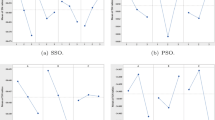Abstract
The problem of production scheduling of manufacturing systems involves the system modeling task and the application of a technique to solve it. This kind of scheduling is characterized by the large number of possible solutions, where several researches have been using the genetic algorithms as a search method to solve this problem, since these algorithms have the capacity of globally exploring the search space and to find good solutions quickly. This paper proposes the use of adaptive genetic algorithm to solve this kind of scheduling problem. The aim of this paper was to obtain a good production schedule considering simultaneous use of machines and automated guided vehicles that minimize the makespan with low running time. The results of this paper were validated in large scenarios and compared with other approach. These results are presented and discussed in this paper.






Similar content being viewed by others
References
Benincasa, A. X., Morandin O., Jr., & Kato, E. R. R. (2003). Reactive fuzzy dispatching rule for automated guided vehicles. In IEEE international conference on systems, man and cybernetics, Washington, DC, USA, v. 5, (pp. 4375–4380).
Chiu, Y. F., & Fu, L. A. (1997). GA embedded dynamic search algorithm over a petri net model for an FMS scheduling. In: Proceedings of the 1997 IEEE international conference on robotics and automation, Albuquerque, New Mexico, v. 1, (pp. 513–518).
Degroot, M. H., & Schervish, M. J. (2001). Probability and statistics (3rd ed.). Reading: Addison-Wesley.
Egbelu, P. J., & Tanchoco, J. M. A. (1984). Characterization of automatic guided vehicle dispatching rules. International Journal of Production Research, 01(22), 359–374.
Jerald, J., Asokan, P., Saravanan, R., & Rani, A. D. C. (2006). Simultaneous scheduling of parts and automated guided vehicles in a FMS environment using adaptive genetic algorithm. International Journal Advanced Manufacturing Technology, 29, 584–589.
Kadadevaramath, R. S., Chen, J. C., Shankar, B. L., & Rameshkumar, K. (2012). Application of particle swarm intelligence algorithms in supply chain network architecture optimization. Expert Systems with Applications, 39(11), 10160–10176.
Lin, T.-L., Horng, S.-J., Kao, T.-W., Chen, Y.-H., Run, R.-S., Chen, R.-J., et al. (2010). An efficient job-shop scheduling algorithm based on particle swarm optimization. Expert Systems with Applications, 37(3), 2629–2636.
McClave, J. T., Benson, P. G., & Sincich, T. (2008). Statistics for business and economics. Englewood Cliffs: Pearson Prentice Hall.
Morandin, O., Jr., Sanches, D. S., Deriz, A. C., Kato, E. R. R., & Tsunaki, R. H. (2008). An adaptive genetic algorithm based approach for production reactive scheduling of manufacturing systems. In: 34rd annual conference of the IEEE Industrial Electronics Society, Orlando, USA (pp. 1461–1466).
Naderi, B., Zandieh, M., Balagh, A. K. G., & Roshanaei, V. (2009). An improved simulated annealing for hybrid flowshops with sequence-dependent setup and transportation times to minimize total completion time and total tardiness. Expert Systems with Applications, 36(6), 9625–9633.
Pongcharoen, P., Hicksa, C., Braidena, P. M., & Stewardson, D. J. (2002). Determining optimum genetic algorithm parameters for scheduling the manufacturing and assembly of complex products. International Journal of Production Economics, 78, 311–322.
Pongcharoen, P., Hicks, C., & Braiden, P. M. (2004). The development of genetic algorithms for the finite capacity scheduling of complex products, with multiple levels of product structure. European Journal of Operational Research, 152, 215–225.
Reddy, B. S. P., & Rao, C. S. P. (2006). A hybrid multi-objective GA for simultaneous scheduling of machines and AGVs in FMS. International Journal Advanced Manufacturing Technology, 31, 601–613.
Sadrzadeh, A. (2012). A genetic algorithm with the heuristic procedure to solve the multi-line layout problem. Computers & Industrial Engineering, 62(4), 1055–1064.
Sankar, S. S., Ponnambalam, S. G., Rajkumar, R., & Gurumarimuthu, M. (2004). An intelligent integrated scheduling model for flexible manufacturing system. In Proceedings of the 2004 IEEE conference on robotics, automation and mechatronics, Singapore (pp. 1095–1100).
Tay, J. C., & Ho, N. B. (2008). Evolving dispatching rules using genetic programming for solving multi-objective flexible job-shop problems. Computers & Industrial Engineering, 54(3), 453–473.
Ulusoy, G., Serifoglu, F. S., & Bilge, U. (1997). A genetic algorithm approach to the simultaneous scheduling of machines and automated guided vehicles. Computers & Operations Research, 14(4), 335–351.
Wong, T., & Ngan, S. (2013). A comparison of hybrid genetic algorithm and hybrid particle swarm optimization to minimize makespan for assembly job shop. Applied Soft Computing, 13(3), 1391–1399.
Yildiz, A. R. (2013). A new hybrid artificial bee colony algorithm for robust optimal design and manufacturing. Applied Soft Computing, 13(5), 2906–2912.
Yin, Y., Yiu, J., & Cheng, Z. (2004). A genetic algorithm based approach to flowshop scheduling. In Proceedings of the 5th world congress on intelligent control and automation, Hangzhou, P.R. China. (pp 3019–3021).
Zhang, L., Wang, L., & Zheng, D. (2006). An adaptive genetic algorithm with multiple operators for flowshop scheduling. International Journal Advanced Manufacturing Technology, 27, 580–587.
Zhang, Q., Manier, H., & Manier, M.-A. (2012). A genetic algorithm with tabu search procedure for flexible job shop scheduling with transportation constraints and bounded processing times. Computers & Operations Research, 39(7), 1713–1723.
Author information
Authors and Affiliations
Corresponding author
Rights and permissions
About this article
Cite this article
Sanches, D.S., Silva Rocha, J.d., Castoldi, M.F. et al. An Adaptive Genetic Algorithm for Production Scheduling on Manufacturing Systems with Simultaneous Use of Machines and AGVs. J Control Autom Electr Syst 26, 225–234 (2015). https://doi.org/10.1007/s40313-015-0174-6
Received:
Revised:
Accepted:
Published:
Issue Date:
DOI: https://doi.org/10.1007/s40313-015-0174-6




